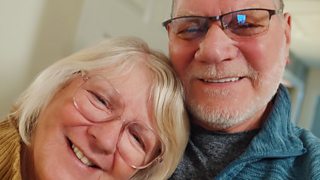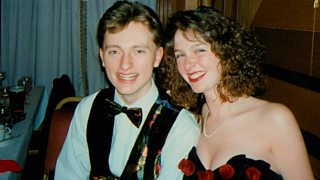Life Changing: I saved 30 people from a sinking ship – but I can’t swim

On March 6th 1987, lorry driver Larry O'Brien narrowly escaped the Zeebrugge ferry disaster, in which almost 200 people lost their lives. Larry – who could not swim – risked his own life to pull over 30 people to safety.
Almost 40 years later, Larry tells Dr Sian Williams about the Life Changing event, why he never felt like a hero and how – after almost three decades in local politics – he decided to return to the road.
Warning: Contains upsetting descriptions.
A last-minute change of plans

For Larry O’Brien, from Wexford in Ireland, it was the freedom of long-distance lorry driving that he loved. But by 1987, Larry had other responsibilities to consider: he was newly married, with one baby and another on the way.
With the birth of his second child due soon, he decided not to drive anywhere for a month. But when a client asked if he would go on a “quick spin to Germany and back”, he agreed to take on one last job.
On the return leg, in a quest to get back to his family in good time, Larry made a beeline for the 7pm sailing from Zeebrugge. When he arrived at the Belgian port, he was told he was too late but – having explained he was in transit to Ireland with very little customs to do – they let him on. His was the last truck to board the boat.
There was a sense of relief and excitement to be heading home.
Terror 'in a matter of seconds'
The ferry, The Herald of Free Enterprise, was busy. The Sun newspaper had run a promotion – a day trip to Belgium, shopping – so it was crowded with passengers.
"I was hanging on to the table… I was lucky my table was bolted to the floor"
Larry decided to get something to eat. “I went into the restaurant,” he recounts. “I sat at the table, looking around at all the people enjoying themselves: shopping, and kids playing and the whole lot.”
It was a cold but calm night. Then suddenly, Larry felt the ship lurch. “I've been on rough seas in boats. I've never felt nothing like that heave before on any boat. It tipped.”
People were falling over everywhere. “It was frightening,” he recalls. “The boat, she came back level, but didn't stay level and went the other way… I was hanging on to the table… I was lucky my table was bolted to the floor.”
There was widespread panic. “It was all over in a matter of seconds… If it took 60 seconds, that's all it took, and she went completely over on her side.”
'Such a force of water'
“The poor people didn't know what to do,” says Larry. “I see people being washed out the windows when the water was coming in. It's hard to explain but it was such a force of water.”
“It takes a lot to frighten me, but I was terrified"
“I'll never forget the screams,” he states. “That'll always be with me, the screams of the poor people… Screams for help.”
Larry clung to his table, watching the water rise, knowing he couldn’t swim. “It takes a lot to frighten me, but I was terrified,” he admits. “I was terrified that I wasn't going to see land again, I wasn't going to see my wife or my child again, or see my second child being born.”
'I knew the only way out was up'
With the ship on her side, everyone was disorientated but Larry was used to being on boats.
“I knew the only way out was up,” he states. He got up on a glass partition and was able to pull a few more people up with him. But he knew it wouldn’t hold.
“I got a fire hose reel and I kind of made a bit of a lasso and got myself up further,” he explains. “I was afraid that the hose might stretch, but it held me.”
From that ledge, he climbed to the porthole. “I took off [my] boot, I started walloping the glass, I lost my grip and I went back down to the water,” he recounts. Grateful not to have injured himself, he made a second attempt. “It took ten minutes to get back up.”
“I could see that the glass in the porthole window was cracked. I gave it a few scalps and it started coming out of the way.” Eventually it was clear of glass and Larry climbed through.
A life-saving decision

Larry pulled himself out on to the side of the ship. “It looked so eerie outside,” he recalls. “I didn't see anyone outside or around us… Everyone was still inside.”
"I had to have a serious chat with myself. Are you going to stand here and do nothing? So, I got a rope.”
He could see a vessel way off in the distance, so he took a cigarette lighter out of his pocket and started clicking it. He knew they were too far away to see him, but he was in survival mode: “The things you do, like, to try to live.”
“I had to have a serious chat with myself. Are you going to stand here and do nothing? So, I got a rope.” He threw it back down through the porthole and began hauling people out.
“Time that night just went so quickly,” he says.
After a short time, a fishing boat pulled up alongside the partially submerged ferry and two fishermen began catching the passengers as they slid down the side of the ship. It was extremely dangerous. “The will to live is a great thing,” Larry remarks.
The lorry driver stayed there for hours, pulling people out. “I took 35 or 40 out that night,” he says. Then, when the emergency services arrived, he made the decision to stop. He joined a fisherman in a trawler, and was taken back to Zeebrugge.
“I wasn't physically hurt,” says Larry. “The only harm I had was my hands were burnt off from a rope from pulling people.”
“The only harm I had was my hands were burnt off from a rope from pulling people.”
Though his palms bear the scars, he feels incredibly lucky compared to the 194 that lost their lives.
Larry did not ring his wife, Cindy, that night. “I didn't want to upset her,” he says.
“Connor was only a week away from being born… Little did I know, news travels fast, even back then.”
At four o'clock that same morning, a reporter was knocking on his mother’s door, asking for a photograph of him. The reporter told her there had been an accident, but that her son was safe. They had no way of getting hold of him.
Eventually, Larry phoned Cindy: “I said, ‘I'm alive.’”
'I had to keep going'
Afterwards, Larry convinced himself he was OK. “I was probably acting tough more so than anything else,” he admits. When Cindy and his daughter Kelly-Anne met him at the airport, the enormity of it all began to hit.
'I just couldn't close my eyes all night. I thought we'd never see land.'
“I had to keep going,” he says. He told Cindy he was returning to work, only days after their son was born.
Larry’s first night back on a ship was an ordeal. “It was a rough, windy night… I was up the bar. I couldn't sleep. I just couldn't close my eyes all night. I thought we'd never see land. I just couldn't settle myself.”
Images from Zeebrugge flooded his mind. “It was a very long night, probably one of the longest ones I remember, but I had to prove that I could do this job.”
A reluctant hero
Larry was labelled a hero. He was presented with the Goodyear European Highway Hero Award, a Belgian award for bravery and a Diploma of Honour from the French government. They are all at home on his wall.
But he’s a reluctant hero, insisting he only did what any other person would have.
“The only advantage I had that night over all those poor other people that were on that boat, I had no one to worry about,” he says. “The other men on that ship with families, they had to worry about seeing their kids being washed away, their wife dying.”
After three months, Larry turned his back on lorry driving. “It was a tough decision for me to make, because I knew nothing else. But the decision had to be made, and I made it.” He was offered a job as a car salesman and took it. Soon, he was sales manager.
'It's in your mind, all the time'
And then, Larry entered politics. “I became chairman of the county council and I got elected for 28 years.”
Now, with his kids grown up, Larry has retired from politics and, in his early seventies, returned to the job he loves.“I was driving a truck the next day. Europe and Ireland and everywhere since.”
What happened is always with him. But when the thoughts come, he bats them away. “It's in your mind, all the time. It never goes away like that,” he says, “but I keep it kind of backwards.”
-
![]()
Listen to the Reluctant Hero episode of Life Changing
Lorry driver Larry O’Brien explains how he saved over 30 people from a sinking ferry, despite not being able to swim.
More from Life Changing
-
![]()
Life Changing: I won ÂŁ50,000 then gambled it away in seven days
When Stacey Goodwin got a new job, it triggered a destructive gambling addiction.
-
![]()
Life Changing: I was shot in the face and blinded - but stayed positive
Ed Stewart went blind after being shot, but a new - albeit risky operation - offered hope.
-
![]()
Life Changing: The childhood love that survived a 45-year hiatus
How it would take four decades for two children's home friends to find each other again.
-
![]()
How one woman had her face rebuilt 17 times
For Jill Clark, one trip to the pub 25 years ago would change her life forever.





